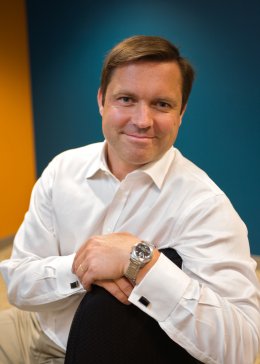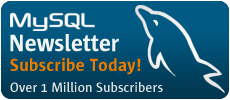About the author

Colin Charles is the Community Relations Manager, APAC at MySQL AB. He lives in Melbourne, Australia and has been with MySQL since 2005. Before joining MySQL, he worked actively on the Fedora and OpenOffice.org projects. He currently spends a lot of his time making community-based projects happy using the MySQL database.
Related Pages:
A Q&A Session with Mårten Mickos, CEO of MySQL AB, about the Sun Acquisition

We got a chance to speak with Mårten Mickos, CEO of MySQL AB, about Sun's planned acquisition of MySQL, and we asked him some questions, that the community at large, might have.
Community Team (CT): Mårten, how are you feeling -- now that Sun has agreed to acquire MySQL AB for $1 billion dollars? Especially, when about a year ago, you mentioned that the AB in MySQL AB stood for "Aiming for a Billion"?
Mårten: When I joined the company, my hope was that I would never have to make a decision affecting the entire MySQL community that wouldn't feel right. So far that has been the case. I went through a deep and reflective time in reaching the conclusion that it would be great to be acquired by Sun, but once through that, I have been only jazzed.
As for "AB", the billion they are paying for our company is great but it is not the billion we are aiming at. We are aiming at a billion in annual revenues. Any lesser goal would be mediocre at best. I strongly believe we can reach the revenue billion faster as part of Sun than otherwise. This is at the core of why I changed my mind and my view on what was best in the future for the product, our users, our customers, our partners and our employees. Of course, aiming at a billion is a dream that will take numerous years to reach. This is a marathon, not a sprint.
CT: Are the founders, Monty and David and Allan, enthusiastic about this?
Mårten: Yes, absolutely. They were all immediately for this. But technically you should ask them, not me. I believe there have been some blogs posted about their reactions.
CT: How did you reach a deal in under five weeks -- especially during the end-of-year holiday season?
Mårten: Shakespeare said, "All things are ready if our minds be so", and I think that is what happened with Sun and us. We found a common tune, and thereafter it was only a question of nailing down the details.
CT: What kind of changes can the MySQL community expect? Will there be benefits from being part of the larger Sun community, along with popular projects like OpenOffice.org and Java?
Mårten: If I may say so, I think this question is backwards. In my world, it is not a community if it "expects" things. A community acts and proposes and makes happen -- especially an open source community. Those who care most about FOSS (free and open source software) already know that they will continue to have all the freedoms they previously had, because the GPL ensures it.
Will there be new opportunities and new interesting technology directions thanks to Sun's vast portfolio of FOSS software? Most certainly, because now many people will be focused on that topic. But, again, there has never been anything stopping MySQL users from integrating MySQL with Java or NetBeans or Glassfish before.
CT: What kind of changes can CIOs and Enterprise customers expect?
Mårten: CIOs and Enterprise customers can expect to get the best Enterprise 2.0 software from us. They will be able to combine the leading-edge technologies that Web 2.0 companies use -- along with the global services of a Fortune 500 company. This should lead to faster product development cycles for enterprises with a lower overall TCO.
CT: Enterprise subscriptions and monitoring currently come at a surprisingly low price. Will there still be unlimited offerings, for USD$40,000? Will the price of the basic Enterprise offering still be USD$500?
Mårten: On a high level, my view is that price levels are determined by markets -- by supply and demand and by competitive situations. Certainly, MySQL has been a great disruptor for pricing models when compared to traditional enterprise database vendors.
Interestingly, no company that I know of gives any guarantees of how long their prices will be in force. MySQL has never given such guarantees nor been asked to give any. That said -- there are currently no plans to change our pricing.
CT: Sun is a big PostgreSQL supporter. Do you see the PostgreSQL and MySQL teams working side-by-side, once the acquisition is complete?
Mårten: I see this situation in a bigger perspective. At MySQL, we have always tried to have excellent relations with the other open source databases. Early on, we cooperated with Sleepycat around Berkeley DB. When we signed our first partnership with SAP, we brought in a Firebird expert to help us define the new roadmap. Then we took over the marketing and selling of MaxDB (previously known as SAPdb) and we made it 10 times more popular. We have always had great connections not only to the PostgreSQL team but also to Richard Hipp (creator of SQLite). And most recently we partnered with Solid. We also regularly meet with the Ingres people. And as you may know, Joshua Drake of the PostgreSQL community will give a speech at the MySQL Conference with the title "What the MySQL community can learn from the Postgres community".
So, yes, we will definitely continue on this path, and we are thrilled to be working with Josh Berkus, PostgreSQL core team member and Sun employee, and with the PostgreSQL community at large.
The rationale behind this is that open source is a superior method for producing software, and all of us open source database projects or vendors have a lot to learn from each other. That's how we will make the biggest possible positive impact in the world.
CT: How does Sun benefit from buying MySQL?
Mårten: As in any good acquisition, there are a number of benefits for all involved. Firstly, Sun acquires ownership of an open source software company that grows very fast. This is a direct revenue benefit -- starting small (in comparison to Sun's revenues) but growing very fast in a (database) market where they haven't played before.
Secondly, this puts Sun right in the middle of the new web economy - Web 2.0, SaaS and Enteprise 2.0. This will allow Sun to offer its software, hardware and services to a broader range of customers.
Thirdly, by cross-pollinating innovations and technology across Sun, we will be able to accelerate the roadmaps of products and improve scalability even further. This will be interesting to the fastest growing companies in the world, opening up new market opportunities for Sun.
CT: Is MySQL fully committed to free and open source software, and the GPL?
Mårten: Yes.
CT: What does the Sun acquisition mean for Linux support? What about Windows, Mac OS/X and other platforms?
Mårten: One of the reasons for us to be interested to discuss an acquisition with Sun was their new strategy to work with technologies and companies that previously had been seen as competitors. Our mandate within Sun is to grow our database business - on all operating systems and with all development and scripting languages and on all hardware platforms. Linux remains the most important operating system for our business. Windows remains the top operating system among our downloads. Mac OS X is a vital platform and many of our own engineers use Mac notebooks.
CT: Will all the language bindings still be supported? i.e Will PHP, Perl, Ruby, etc. be treated as well as Java?
Mårten: Absolutely. See my previous answer. Our goal and mandate is to grow our business on all fronts.
This is the main change from the past. You can still see old-school companies who develop and promote monolithic and proprietary stacks, fighting all the other alternatives. But Sun has come to the insight that this is a losing strategy in the 21st century. Sun certainly has its own products, but it wisely also knows to build a business across all vectors of growth. As an example, isn't it great that IBM is now OEMing Solaris from Sun? Five years ago, who would have believed that this could happen? Clearly, IBM and Sun understand the reality of the modern online world.

